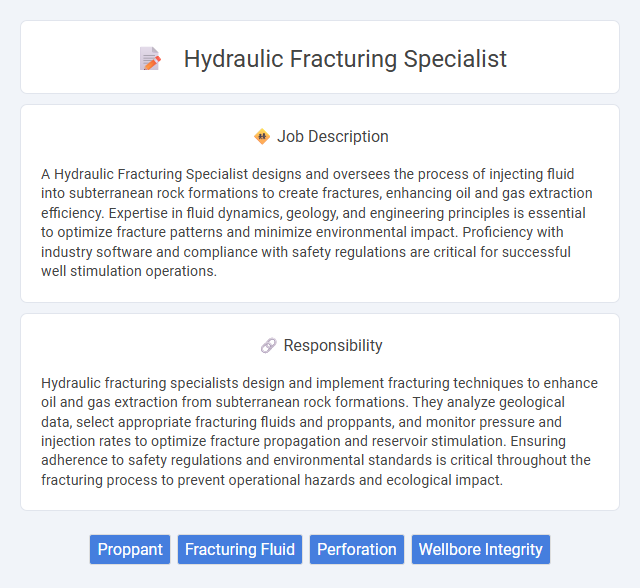
A Hydraulic Fracturing Specialist designs and oversees the process of injecting fluid into subterranean rock formations to create fractures, enhancing oil and gas extraction efficiency. Expertise in fluid dynamics, geology, and engineering principles is essential to optimize fracture patterns and minimize environmental impact. Proficiency with industry software and compliance with safety regulations are critical for successful well stimulation operations.
Individuals with strong analytical skills and a tolerance for physically demanding environments may find a hydraulic fracturing specialist role suitable. There is a likelihood that those comfortable with teamwork, variable work locations, and adherence to safety protocols will adapt well to job conditions. Candidates sensitive to long hours, exposure to hazardous materials, or high-pressure situations might find this profession less compatible with their preferences.
Qualification
A Hydraulic Fracturing Specialist must possess a bachelor's degree in petroleum engineering, mechanical engineering, or a related field, with extensive knowledge of reservoir engineering and fluid mechanics. Proficiency in hydraulic fracturing simulation software such as FracPro and strong analytical skills for interpreting subsurface data are essential. Certification in well control and health, safety, and environmental (HSE) management further enhances qualification and industry credibility.
Responsibility
Hydraulic fracturing specialists design and implement fracturing techniques to enhance oil and gas extraction from subterranean rock formations. They analyze geological data, select appropriate fracturing fluids and proppants, and monitor pressure and injection rates to optimize fracture propagation and reservoir stimulation. Ensuring adherence to safety regulations and environmental standards is critical throughout the fracturing process to prevent operational hazards and ecological impact.
Benefit
Hydraulic fracturing specialists likely experience competitive salaries and extensive opportunities for career advancement in the energy sector. Their expertise in optimizing extraction processes probably leads to increased operational efficiency and reduced environmental impact. Employers may also offer benefits such as health insurance, bonuses, and continuing education support to retain skilled professionals in this field.
Challenge
Hydraulic fracturing specialists likely face complex challenges in managing high-pressure operations safely and efficiently. The probability of encountering unexpected geological formations requires quick problem-solving and adaptation to prevent costly delays or environmental risks. Staying updated with regulatory changes and technological advancements is also a probable ongoing challenge in this dynamic field.
Career Advancement
Hydraulic fracturing specialists possess expertise in designing and implementing fracture treatments to optimize oil and gas well production, leveraging advanced technology and industry standards. Career advancement opportunities include progressing to senior engineering roles, project management positions, or technical consultancy within oilfield services companies and energy corporations. Continuous professional development and certification in reservoir engineering and environmental compliance enhance prospects for leadership and specialized technical roles in this high-demand sector.
Key Terms
Proppant
Hydraulic fracturing specialists manage the selection and deployment of proppants to maintain fracture conductivity and optimize hydrocarbon flow in oil and gas wells. Expertise in proppant properties such as size, strength, and composition directly impacts reservoir stimulation efficiency and production rates. Advanced knowledge of proppant transport dynamics and reservoir geology is crucial for designing effective fracturing treatments that maximize resource recovery.
Fracturing Fluid
Hydraulic fracturing specialists design and manage fracturing fluid formulations to enhance well productivity by optimizing viscosity, proppant transport, and chemical composition. They utilize advanced fluid dynamics and chemical additives to ensure efficient fracture propagation and minimize formation damage. Expertise in tailoring fracturing fluid properties to specific geological formations significantly improves hydrocarbon recovery rates and operational safety.
Perforation
A Hydraulic Fracturing Specialist specializing in perforation designs and implements precise perforating techniques to optimize hydrocarbon flow within reservoirs. Utilizing advanced downhole tools, they coordinate the creation of perforation tunnels to enhance fracture initiation and conductivity. Expertise in analyzing rock properties and pressure data ensures maximum reservoir stimulation efficiency and production rates.
Wellbore Integrity
A Hydraulic Fracturing Specialist ensures wellbore integrity by designing and executing stimulation treatments that prevent formation damage and maintain casing stability. Expertise in pressure management, fluid selection, and proppant placement optimizes fracture propagation while minimizing risks of leaks or blowouts. Continuous monitoring and evaluation of wellbore conditions are essential to safeguard structural integrity throughout the hydraulic fracturing process.
 kuljobs.com
kuljobs.com